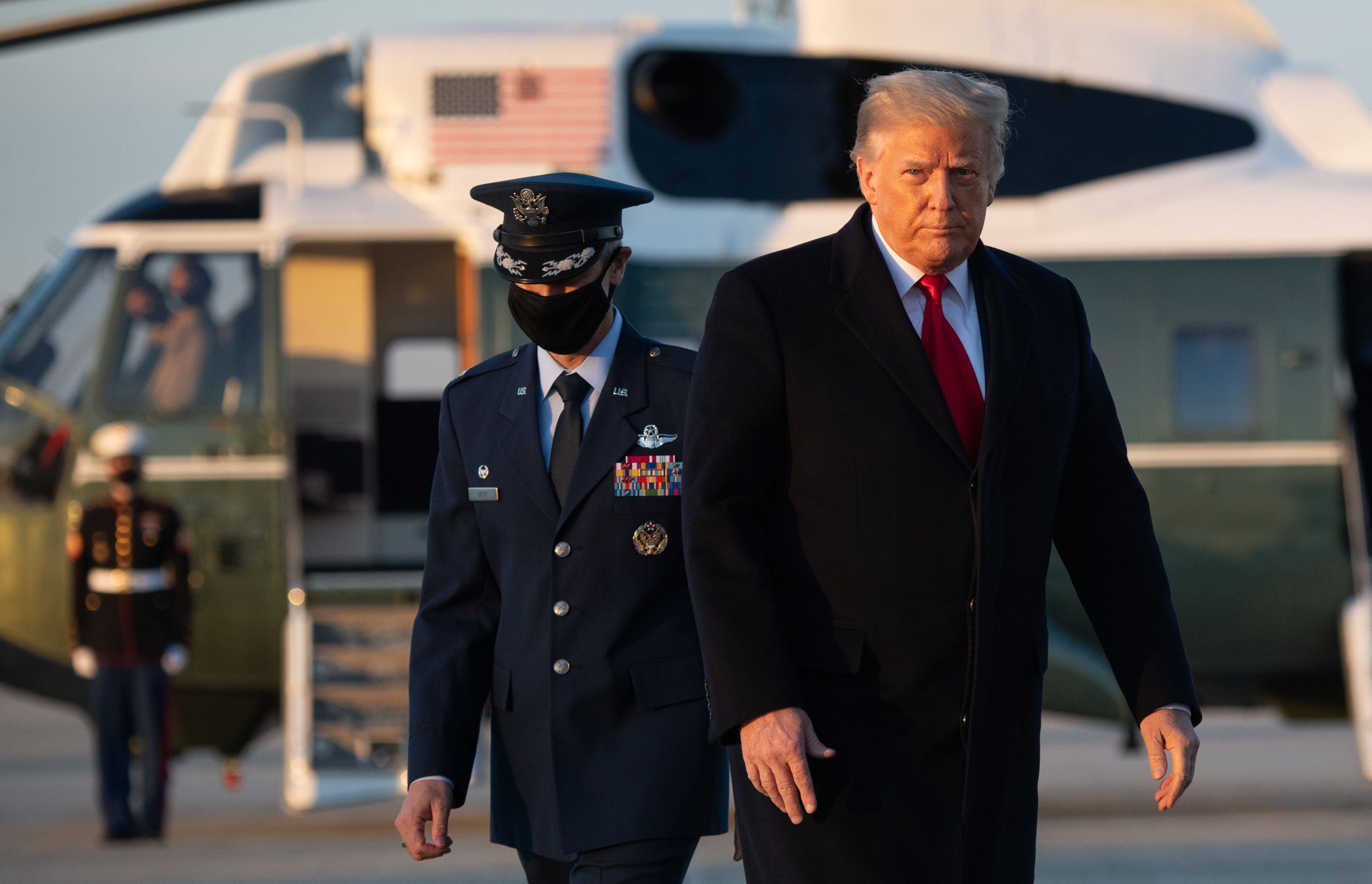With weeks left in Trump’s presidency, confrontation between Iran and US spikes
‘If one American is killed, I will hold Iran responsible,’ warned the outgoing US president

Your support helps us to tell the story
From reproductive rights to climate change to Big Tech, The Independent is on the ground when the story is developing. Whether it's investigating the financials of Elon Musk's pro-Trump PAC or producing our latest documentary, 'The A Word', which shines a light on the American women fighting for reproductive rights, we know how important it is to parse out the facts from the messaging.
At such a critical moment in US history, we need reporters on the ground. Your donation allows us to keep sending journalists to speak to both sides of the story.
The Independent is trusted by Americans across the entire political spectrum. And unlike many other quality news outlets, we choose not to lock Americans out of our reporting and analysis with paywalls. We believe quality journalism should be available to everyone, paid for by those who can afford it.
Your support makes all the difference.Iran and the United States are escalating their war of words in the final weeks of the presidency of Donald Trump, with both longtime adversaries warning each other over provocations that could lead to a military confrontation.
The latest round of accusations between Washington and Tehran followed a barrage of 21 rockets that struck near the US embassy compound in Baghdad on 20 December, rattling nerves among the hundreds of American diplomatic and security personnel deployed to the sprawling and heavily guarded facility.
The renewed tensions add to pressures in Iraq, where anger has erupted over Mr Trump’s commuting of the sentences of four Blackwater mercenaries jailed for a massacre in Baghdad 13 years ago.
The US said Sunday’s attack, the largest on the embassy in a decade, was "almost certainly conducted by an Iranian-backed rogue militia group". Iran has denied responsibility.
On Thursday, Iraqi media reported a roadside bomb attack on a military convoy attached to the US-led coalition fighting Isis south of Baghdad. No injuries were reported.
Attacks on the embassy compound have taken place frequently over the years, carried out mostly by Iranian-backed Shia militias but also occasionally by Sunni militant groups that retain a presence in Iraq.
"While this 21-rocket attack caused no US injuries or casualties, the attack did damage buildings in the US Embassy compound, and was clearly not intended to avoid casualties," US Capt Bill Urban, a spokesman for US armed forces in the southwest and central Asia said in a statement.
“These groups are Iranian-backed because Iran provides both material support and direction,” he said. “They are rogue because they are actually acting on behalf of Iranian interests and direction in a direct betrayal of Iraqi sovereignty.”
Mr Trump late Wednesday posted a photograph of some of the rockets that he said failed to reach their intended target.
“Guess where they were from: IRAN,” Mr Trump wrote on Twitter. “Now we hear chatter of additional attacks against Americans in Iraq. Some friendly health advice to Iran: If one American is killed, I will hold Iran responsible. Think it over.”
Iran’s foreign minister Mohammad Javad Zarif accused Mr Trump of attempting to use Iran to distract Americans from his handling of the Coronavirus pandemic.
“Putting your own citizens at risk abroad won't divert attention from catastrophic failures at home,” he wrote, posting past tweets by the president warning that his predecessor Barack Obama was seeking a war with Iran.
Iran has condemned Sunday’s attack, and prominent Iraq’s Shia militias have denied responsibility, in one case blasting the government for failing to maintain security. Iran’s foreign ministry suggested in a statement that the attack was a “false flag” operation.
“The finger is pointed at the US itself as well as its partners and allies in the region, which seek to escalate tensions and provoke fresh sedition in the region,’ said a statement posted to Twitter.
Iranian General Ismail Qaani met with Iraqi Prime Minister Mustafa al-Kahdimi on Tuesday in what Iraqi media described was an attempt to deny Iran was behind Sunday’s attacks.
Americans are worried about potential attacks on their personnel in Iraq and elsewhere in the Middle East coinciding with the 3 January 2020 anniversary of the US assassination of Iranian commander Qassem Suleimani outside Baghdad airport. Abu Mahdi al-Muhandis, a prominent Iraqi politician and controversial leader of Shia militias, was killed in that drone strike, and his supporters have vowed vengeance.
Iraqis are also enraged over Mr Trump’s decision to commute the sentences of a group of American mercenaries convicted of murdering and wounding dozens of unarmed civilians in a 2007 massacre in central Baghdad. Iraq’s foreign ministry condemned Mr Trump’s 11th hour moves of the mercenaries, who worked for a firm that at the time was owned by Erik Prince, the brother of the education secretary.
"This decision did not take into consideration the seriousness of the crime and is not consistent with the US administration's declared commitment to human rights values, justice and the rule of law and regrettably ignores the dignity of the victims and the feelings and the rights of their relatives," a statement said.
Iraqis on social media were less diplomatic. "Death to America, death to America,” one tweeted to their followers. “The people of Iraq should know that our blood is not worthless.”



Join our commenting forum
Join thought-provoking conversations, follow other Independent readers and see their replies
Comments